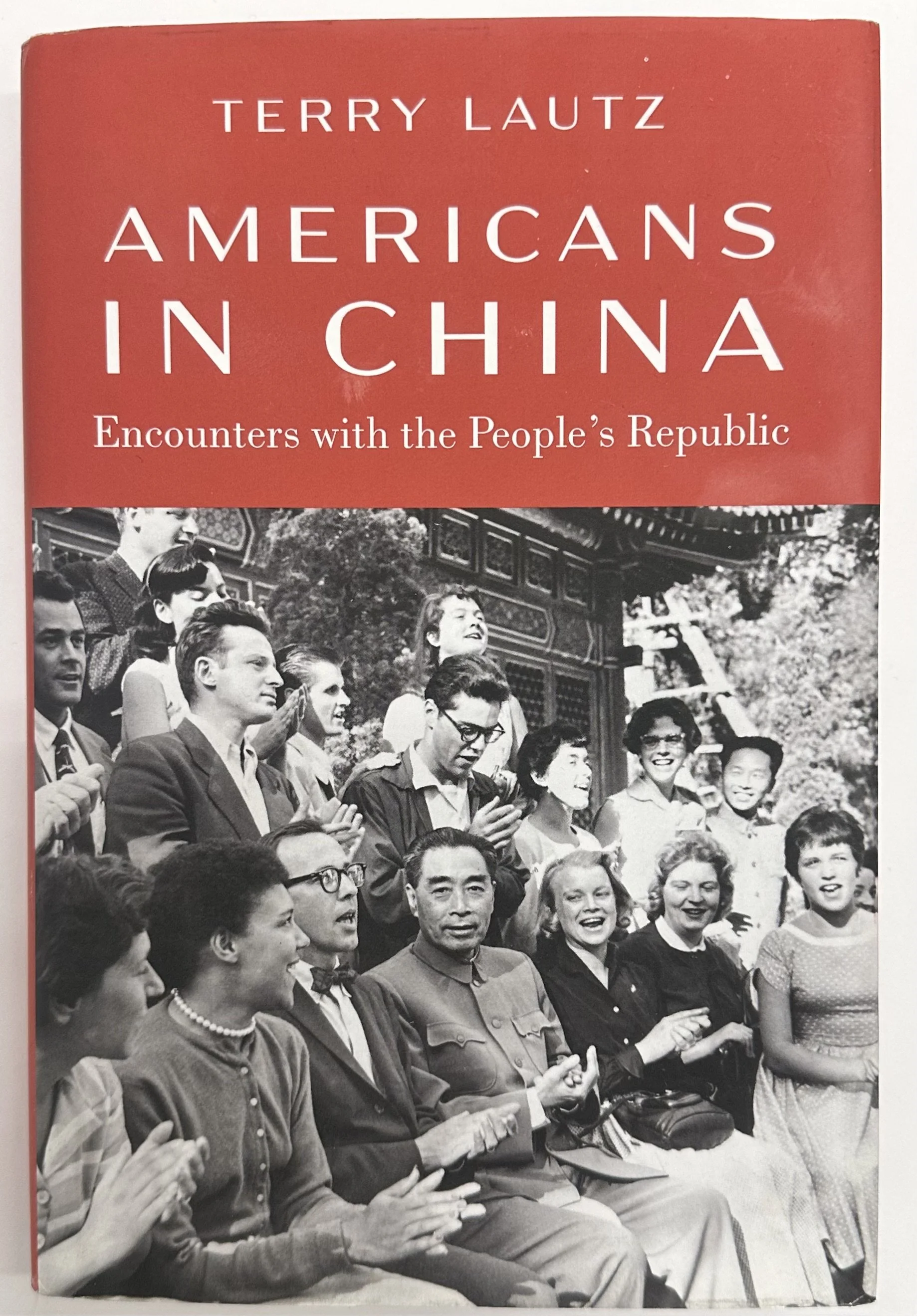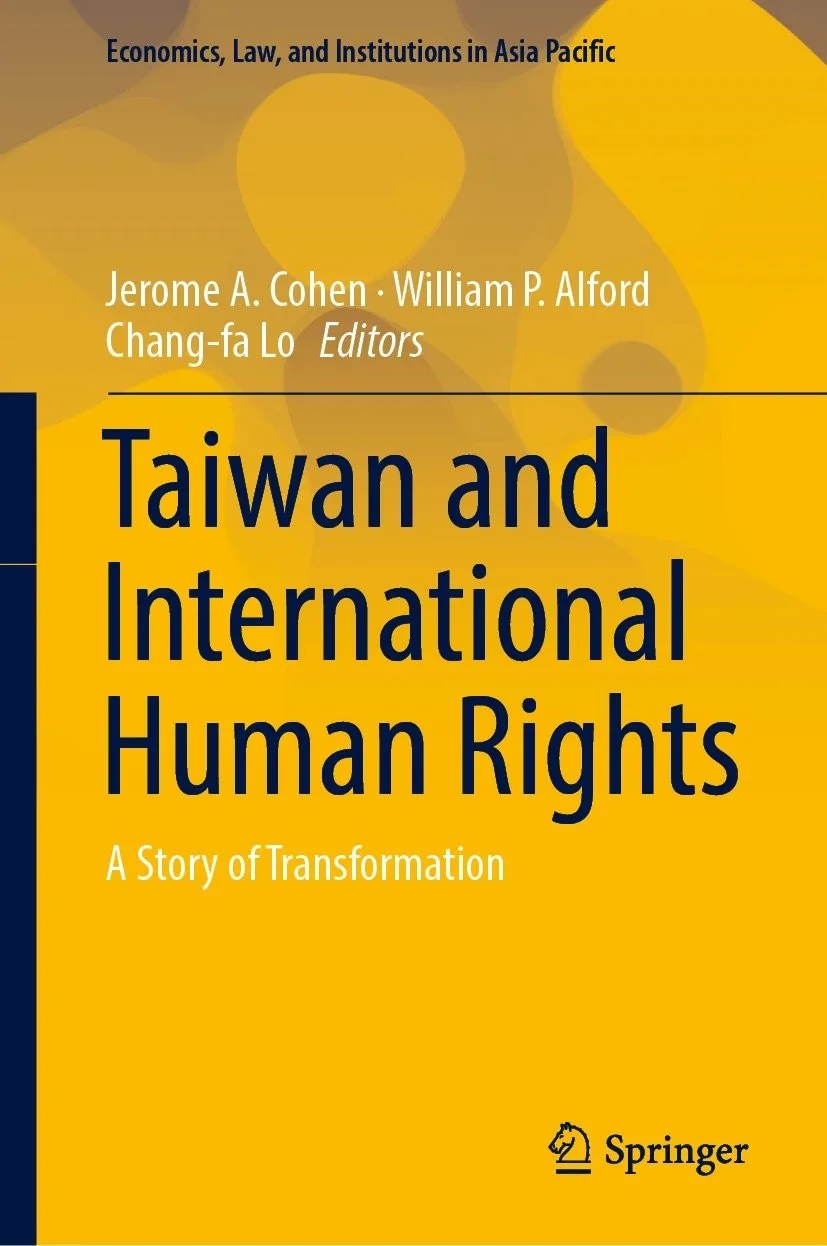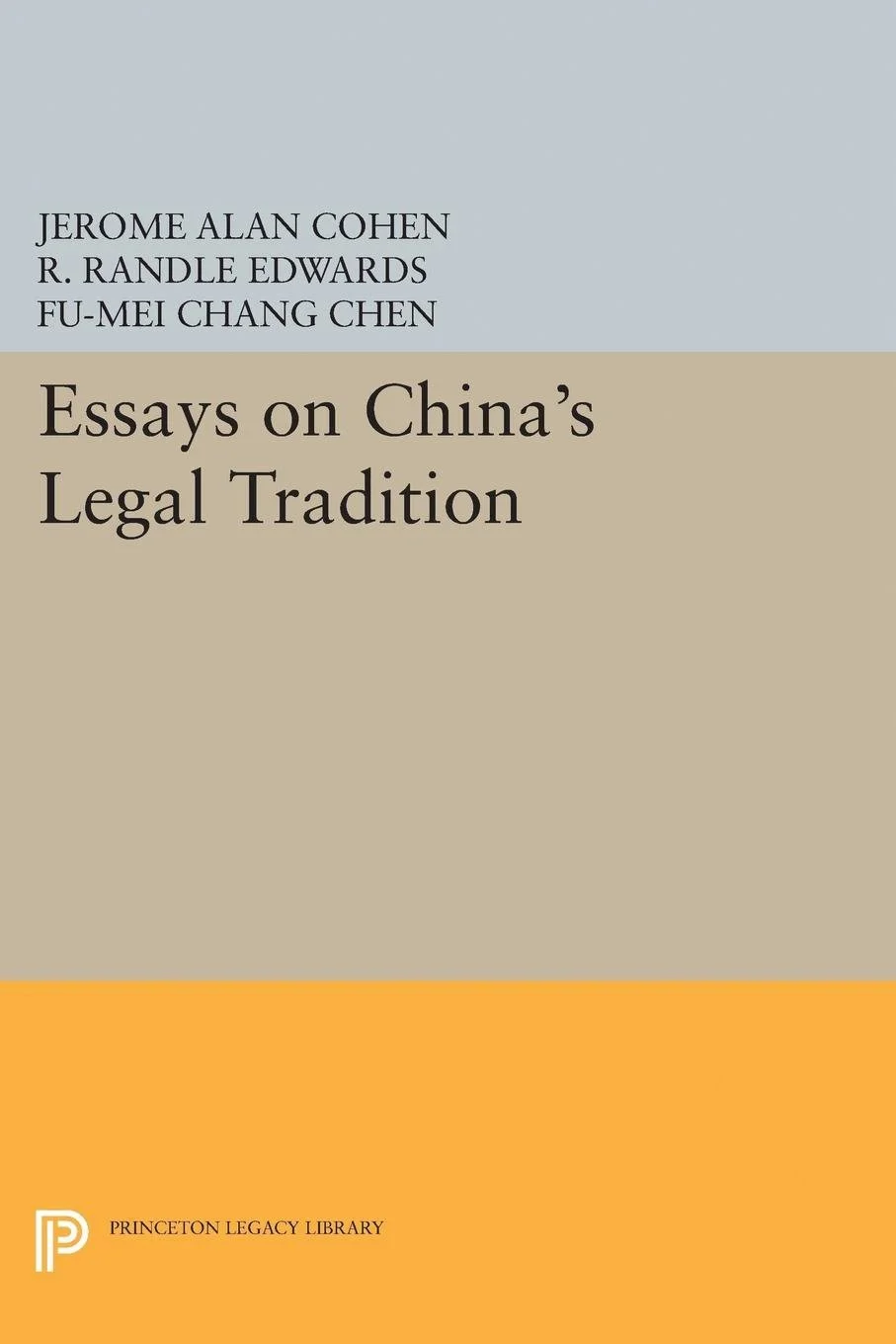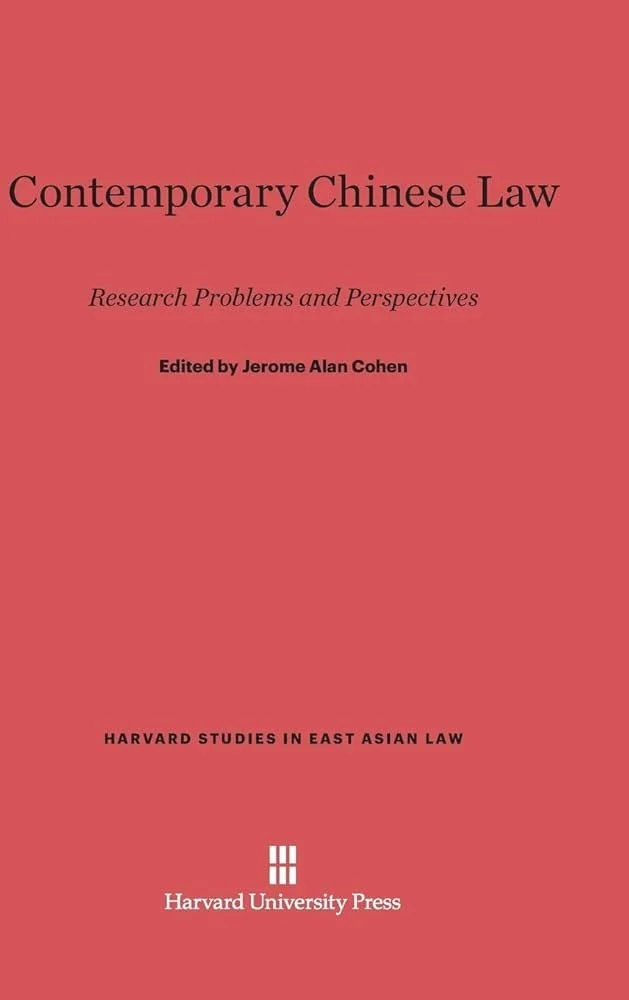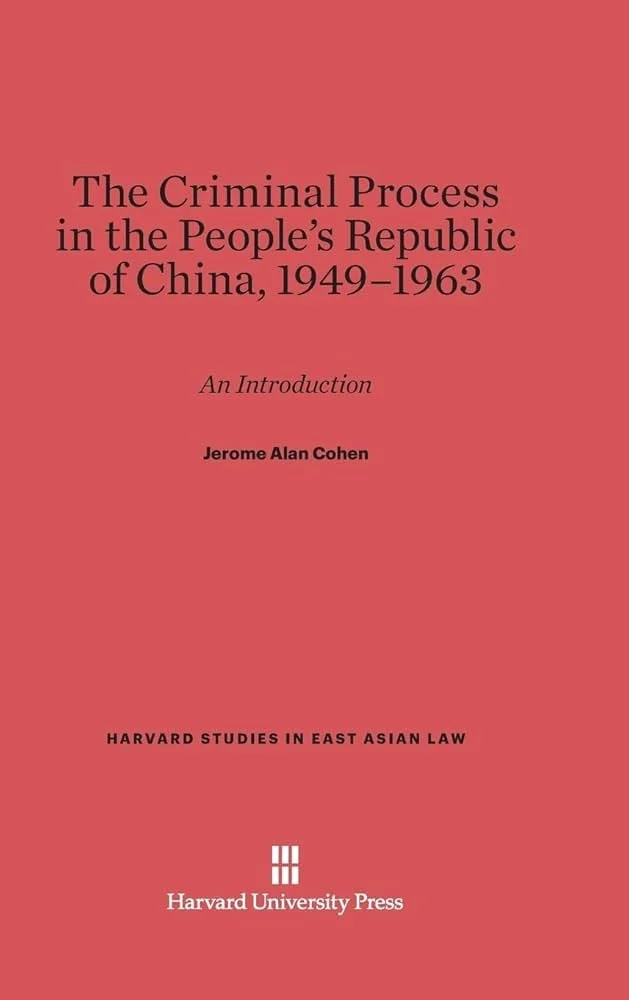Digital Archive
Jerome Alan Cohen
Joan Lebold Cohen
BIOGRAPHY Jerome Alan Cohen + Joan Lebold Cohen
Chaper 6 of Americans in China: Encounters with the People's Republic [chapter page range] (Terry Lautz, Oxford University Press, 2022)Americans in China: Encounters with the People's Republic
Chapter 6 of Americans in China: Encounters with the People's Republic follows Jerome and Joan Cohen, who played key roles in U.S.-China relations. Jerome, a legal scholar, helped introduce Chinese law to the West, while Joan, an art historian, documented China’s evolving art scene. Living in Beijing, they navigated cultural and political complexities, fostering cross-cultural understanding through their work in law and art.
BOOKS Jerome A. Cohen
2019, SpringerChallenge to China: How Taiwan Abolished Its Version of Re-Education Through Labor
Challenge to China examines Taiwan’s legal reforms and their implications for China, particularly in curbing police power. Jerome A. Cohen and Margaret K. Lewis explore Taiwan’s abolition of labor camps for liumang (hooliganism) in 2009 and how this success challenges China’s long-promised but unfulfilled reforms of its re-education through labor system. Drawing from legal texts, judicial decisions, and firsthand research, the book provides a compelling comparison of both systems. Accessible to general readers and legal experts alike, it highlights Taiwan’s legal progress as a model for China’s potential reforms.
2013, Berkshire Publishing GroupTaiwan and International Human Rights: A Story of Transformation
This book explores Taiwan’s transformation from an authoritarian regime to a democracy committed to human rights, despite challenges during the martial law era. It examines the role of institutions like the Constitutional Court and Control Yuan in human rights protection, as well as Taiwan’s voluntary adoption of international human rights treaties. The book highlights the contributions of NGOs, unresolved issues such as the death penalty, and progress in civil, political, economic, and social rights, including protections for marginalized groups. Offering a comprehensive view, it presents Taiwan’s efforts to uphold human rights despite its exclusion from international conventions.
Challenge to China: How Taiwan Abolished Its Version of Re-Education Through Labor
"The Death Penalty: Judicial Controls and Alternative Punishments" (Si xing si fa kong zhi lun ji qi ti dai cuo shi), published by Fa Lü Chu Ban She in 2008, provides an in-depth analysis of China's death penalty system and explores potential reforms aimed at aligning with international human rights standards. The book examines the historical application of capital punishment in China, highlighting the tension between traditional practices and contemporary legal reforms. It discusses the role of judicial controls in regulating the death penalty and considers alternative sanctions, such as life imprisonment, as viable substitutes. The author also addresses the challenges of implementing these reforms within China's unique political and cultural context, offering insights into the complexities of balancing punitive measures with human rights considerations.
2008, Fa lü chu ban sheInvestment Law and Practice in Vietnam: A Specially Commissioned Report
This specially commissioned report provides extensive commentary on the new investment legislation and provides reliable translations of the most relevant documents. Areas covered include: forms of investment, labour taxation, the financial environment and dispute resolution.
1990, LongmanContract Laws of the People's Republic of China
"Contract Laws of the People's Republic of China," authored by Jerome A. Cohen with assistance from Yvonne Y.F. Chan and Ho Yuk Ming, is a comprehensive examination of China's contract law framework as of its 1988 publication. The book provides an in-depth analysis of the legal principles governing contracts in China, reflecting the country's efforts to modernize its legal system during that period. It serves as a valuable resource for understanding the intricacies of Chinese contract law, offering insights into the legislative developments and legal reforms that have shaped contractual relationships in the People's Republic of China.
1988, LongmanEssays on China's Legal Tradition
A comprehensive collection of scholarly works that delve into the complexities of China's historical legal system. This anthology examines the evolution of Chinese law, highlighting the interplay between Confucian and Legalist philosophies in shaping legal practices. Key topics include the Eight Deliberations—a set of principles used to mitigate legal punishments for the elite—and the influential role of figures like Zichan in the development of legal institutions. The essays provide valuable insights into how traditional Chinese law balanced moral values with legal enforcement, offering readers a nuanced understanding of China's legal heritage.
1980, Princeton University PressPeople's China and International Law: A Documentary Studies
1974, Princeton University Press"People's China and International Law: A Documentary Study," co-authored by Jerome A. Cohen and Hungdah Chiu and published by Princeton University Press in 1974, offers a comprehensive analysis of the People's Republic of China's (PRC) perspectives on international law. Through an extensive introduction, the authors discuss the experiences of previous Chinese governments with international law and examine the relationship between Marxist-Leninist ideology and China's legal positions. The two-volume work presents a thorough collection of documents and commentary, providing valuable insights into how the PRC's ideological framework influenced its approach to international legal matters during that period.
China's Practice of International Law: Some Case Studies
"China's Practice of International Law: Some Case Studies," edited by Jerome A. Cohen and published by Harvard University Press in 1972, is a seminal work that examines the People's Republic of China's engagement with international law through detailed case studies. The book delves into China's recognition practices, establishment of diplomatic relations, treaty negotiations, and dispute resolutions, providing insights into how China's ideological stance and political objectives influenced its legal interactions on the global stage during that period. This collection offers valuable perspectives on China's approach to international legal norms and its strategies in navigating complex international issues.
1974, Harvard University PressChina Trade Prospects and U.S. Policy
"China Trade Prospects and U.S. Policy," authored by Jerome Alan Cohen, Robert F. Dernberger, and John R. Garson, is a comprehensive analysis of the economic relationship between China and the United States as of its 1971 publication. The book examines China's trade potential and the implications for U.S. policy, providing insights into the economic strategies of both nations during that period. Spanning 329 pages, this work offers an in-depth exploration of trade dynamics, policy considerations, and the broader economic context of U.S.-China relations in the early 1970s.
1971, PraegerContemporary Chinese Law: Research Problems and Perspectives
"Contemporary Chinese Law: Research Problems and Perspectives," is a seminal work that delves into the complexities of studying the legal system of the People's Republic of China. This anthology comprises thirteen essays that address the methodologies for researching Chinese law, the availability and challenges of accessing legal materials, and the intricacies involved in making these materials comprehensible to Western scholars. The contributors also evaluate foreign works on Chinese law, explore the difficulties in translation, and draw comparisons between the Chinese legal system and those of the West and the Soviet Union. Cohen's insightful introduction offers a comprehensive overview of the global development of Chinese legal studies, setting the stage for the in-depth analyses that follow.
1970, Harvard University PressEastward, Westward: A Life in Law
Few Americans have done more than Jerome A. Cohen to advance the rule of law in East Asia. The founder of the study of Chinese law in the United States and a tireless advocate for human rights, Cohen has been a scholar, teacher, lawyer, and activist for more than sixty years. Moving among the United States, China, and Taiwan, he has encouraged legal reforms, promoted economic cooperation, mentored law students—including a future president of Taiwan—and brokered international crises.
March 2025The Dynamics of China's Foreign Relations
"The Dynamics of China's Foreign Relations," edited by Jerome Alan Cohen and published by the East Asian Research Center at Harvard University Press in 1970, offers a comprehensive analysis of China's international relations during a pivotal era. This anthology brings together scholarly essays that examine China's diplomatic strategies, ideological influences, and interactions with both neighboring and Western countries. The collection provides valuable insights into the complexities of China's foreign policy, reflecting the nation's efforts to navigate its role on the global stage amidst internal and external challenges.
1970, Harvard University PressThe Criminal Process in the People's Republic of China, 1949-1963: An Introduction
In "The Criminal Process in the People's Republic of China, 1949–1963: An Introduction," published by Harvard University Press in 1968, Jerome Alan Cohen provides an in-depth examination of China's criminal justice system during its formative years under Communist rule. Drawing from extensive research, including interviews with refugees and analysis of available legal materials, Cohen explores the structure and function of legal institutions, the implementation of criminal procedures, and the political influences shaping the administration of justice. This work offers a foundational understanding of the evolution of China's legal system in the early years of the People's Republic.
1968, Harvard University PressARTICLES Jerome A. Cohen
Hong Kong’s Transformed Criminal Justice System: Instrument of Fear
In "Hong Kong’s Transformed Criminal Justice System: Instrument of Fear" (Academia Sinica L.J., 2022 Special Issue), Jerome A. Cohen examines how the National Security Law (NSL) has fundamentally reshaped Hong Kong’s legal system into a tool of political suppression. He highlights the erosion of judicial independence, the reversal of bail rights, the elimination of jury trials, and the politicization of prosecutions, all of which contribute to an atmosphere of fear and self-censorship. Cohen argues that these changes align Hong Kong’s criminal justice system more closely with mainland China’s authoritarian legal framework, effectively stifling dissent and weakening the rule of law.
Academia Sinica L.J. 2022 Special Issue, at 1'Rule of Law' with Chinese Characteristics: Evolution and Manipulation
In "Hong Kong’s Transformed Criminal Justice System: Instrument of Fear" (Academia Sinica L.J., 2022 Special Issue), Jerome A. Cohen examines how the National Security Law (NSL) has fundamentally reshaped Hong Kong’s legal system into a tool of political suppression. He highlights the erosion of judicial independence, the reversal of bail rights, the elimination of jury trials, and the politicization of prosecutions, all of which contribute to an atmosphere of fear and self-censorship. Cohen argues that these changes align Hong Kong’s criminal justice system more closely with mainland China’s authoritarian legal framework, effectively stifling dissent and weakening the rule of law.
19 Int’l J. Const. L. 1882 (2021)Putting Lawyers (of All Types) High on Professor William P. Alford's Future Agenda
In his tribute, "Putting Lawyers (of All Types) High on Professor William P. Alford's Future Agenda," published in the Harvard International Law Journal (Vol. 62, 2021), Jerome A. Cohen reflects on Professor Alford's distinguished career in legal academia and administration. Cohen acknowledges Alford's significant contributions to the study of Chinese law and his leadership in Harvard's East Asian Legal Studies program. He suggests that, as Alford transitions from administrative roles, he might focus on pressing issues such as the evolving functions of lawyers in China, the challenges faced by human rights attorneys, and the broader implications of China's legal developments on international law.
62 Harv. Int’l L.J. 35 (2021)Hail to OCU Law School’s Intrepid Helmsman in China!
In his article, "Hail to OCU Law School's Intrepid Helmsman in China!" published in the Oklahoma City University Law Review (Vol. 45, 2020), Jerome A. Cohen reflects on the pioneering efforts of Oklahoma City University's (OCU) School of Law in establishing legal education programs in China. He highlights the instrumental role played by individuals such as Gu Ming, an OCU M.B.A. graduate who impressed faculty and was subsequently awarded a scholarship to attend OCU's law school. Cohen underscores how these initiatives have fostered cross-cultural legal exchanges and contributed to the development of legal education in China.
45 Okla. City U. L. Rev. 23 (2020)China-Taiwan Relations Re-Examined: The “1992 Consensus” and Cross-Strait Agreements
In the article, "China-Taiwan Relations Re-Examined: The '1992 Consensus' and Cross-Strait Agreements," published in the University of Pennsylvania Asian Law Review (Vol. 14, 2019), Jerome A. Cohen and Yu-Jie Chen critically analyze the so-called "1992 Consensus" and its impact on agreements between China and Taiwan. They argue that the "1992 Consensus," a term coined years after the 1992 meetings, lacks a clear, mutually agreed-upon definition, leading to differing interpretations by the involved parties. This ambiguity has resulted in challenges in implementing cross-strait agreements, as each side operates under its own understanding of the consensus. The authors suggest that for future negotiations to be effective, there must be a mutual acknowledgment of these differing perspectives and a concerted effort to establish clearer terms.
14 U. Pa. Asian L. Rev. 1 (2019) (with Yu-Jie Chen)Law’s Relation to Political Power in China: A Backward Transition
In his article "Law's Relation to Political Power in China: A Backward Transition," published in the Social Research journal (Vol. 86, 2019), Jerome A. Cohen examines the evolving dynamics between legal institutions and political authority in China. He argues that, contrary to earlier reforms aimed at strengthening the rule of law, recent developments have led to a regression, with the Chinese Communist Party (CCP) increasingly asserting its dominance over the legal system. This shift undermines judicial independence and reinforces the CCP's control, signaling a move away from legal reforms that previously aimed to establish a more autonomous judiciary.
86 Soc. Res. 231 (2019)Law and Power in China’s International Relations
In his article, "Law and Power in China's International Relations," published in the New York University Journal of International Law and Politics (Vol. 52, 2019), Jerome A. Cohen examines China's evolving engagement with international law. He analyzes China's participation in the World Trade Organization, its approaches to territorial and maritime disputes, and its involvement in bilateral and multilateral human rights agreements. Cohen observes that while China increasingly utilizes international legal frameworks to advance its national interests, it often resists legal constraints that might limit its sovereignty. He suggests that China's growing influence may lead it to seek reforms in the international legal order to better align with its strategic objectives, reflecting a nuanced interplay between law and power in its foreign relations.
86 Soc. Res. 231 (2019)China–Taiwan Repatriation of Criminal Suspects: Room for Human Rights?
Jerome A. Cohen and Yu-Jie Chen analyze the mechanisms and challenges involved in the repatriation of criminal suspects between China and Taiwan. They highlight how political tensions and the absence of formal extradition agreements have led to ad hoc arrangements, often lacking transparency and consistency. The authors express concern that these informal practices may compromise the human rights of suspects, as they are conducted without clear legal frameworks or oversight. Cohen and Chen advocate for the establishment of formal, transparent, and human rights-compliant extradition agreements to ensure that the rights of individuals are protected during the repatriation process.
48 Hong Kong L.J. 1029 (2018) (with Yu-Jie Chen)Hong Kong in 1963-1964: Adventures of a Budding China Watcher
Jerome A. Cohen reflects on his experiences in Hong Kong during the early 1960s. He describes his observations of the city's legal and political landscape, providing insights into the complexities of Hong Kong's relationship with mainland China during that period. Cohen's narrative offers a personal perspective on the challenges and opportunities he encountered as a burgeoning China scholar in a rapidly changing environment.
47 Hong Kong L.J. 291 (2017)Law and China's 'Open Policy': A Foreigner Present at the Creation
Jerome A. Cohen reflects on his firsthand experiences during the early stages of China's Open Door Policy initiated in the late 1970s. Cohen provides a personal narrative of his involvement in China's legal reforms, highlighting the challenges and opportunities encountered while engaging with Chinese legal institutions and professionals. He discusses the complexities of navigating China's evolving legal landscape as a foreign legal expert and the broader implications of China's integration into the global legal community.
65 Am. J. Compar. L. 729 (2017)How Taiwan's Constitutional Court Reined in Police Power: Lessons for the People's Republic of China
The article discusses the lessons that the People's Republic of China can reportedly learn from the Taiwan Constitutional Court's apparent reining in of Taiwanese police power as of May 2014, focusing on the structure of constitutional review in Taiwan and the legal regime for punishing "hooligans (liumang). The principle of legal clarity is addressed, along with a secret witness system and the legal right to confront and examine a witness. Taiwan's criminal procedure code is examined.
37 Fordham Int'l L.J. 863 (2014) (with Margaret K. Lewis) Settling International Business Disputes with China: Then and Now
The article offers information on the significant history, laws and principal methods such as mediation, negotiation, arbitration, and adjudication for settling international business disputes with third parties in China under the international contract law. It analyzes the role of the Legal Department of the China Council for the Promotion of International Trade (CCPIT) and the International Chamber of Commerce in arbitration of international conflicts with foreign companies.
47 Cornell Int'l L.J. 555 (2014)Keynote Address: Hungdah Chiu, China, and International Law: A Life Well Spent
The article reflects on the remarkable career of Professor Hungdah Chiu and his significant contributions to the field of international law, particularly concerning China. Cohen highlights Chiu's dedication to advancing legal scholarship and fostering understanding between China and the international community. He emphasizes Chiu's role in promoting the rule of law and his efforts in bridging cultural and legal differences. Cohen's address underscores the profound impact of Chiu's work on international legal studies and his enduring legacy in the field.
27 Md. J. Int’l L. 9 (2012)Ted Kennedy's Role in Restoring Diplomatic Relations with China
The article examines Senator Ted Kennedy's pivotal contributions to the normalization of U.S.-China relations. Cohen highlights how, during a period of widespread anti-Communist sentiment, Kennedy advocated for re-evaluating U.S. policy towards China. Through a series of speeches, Kennedy addressed key issues such as maintaining relations with Taiwan while establishing ties with Mainland China, representation in international organizations, the U.S.-Taiwan defense treaty, and promoting democracy for the Taiwanese people. Cohen underscores Kennedy's foresight and courage in challenging prevailing attitudes, which laid the groundwork for the eventual normalization of diplomatic relations between the United States and China.
14 N.Y.U. J. Legis. & Pub. Pol’y 347 (2011)This Report is submitted to the Executive Committee of The Association of the Bar of the City of New York (New York City Bar Association), to the Association’s Council on International Affairs and to its committees on Asian Affairs and International Human Rights by members of a mission appointed by the Association to visit the People’s Republic of China (China) and Hong Kong S.A.R. in response to an invitation from the Beijing Lawyers Association to discuss matters of mutual concern to the two associations, including the training and independence of lawyers and the administration of justice.
48 Colum. J. Transnat’l L. 519 (2010) (with John M. Walker, Jr. et al.)The Plight of China's Criminal Defense Lawyers
This article describes and analyses the problems of China’s criminal defence lawyers in gaining access to and representing detained clients during the investigation, indictment and trial stages of the criminal process, with brief reference to problems at the appeal and post-conviction stages. The article also discusses the harassment and intimidation suffered by defence counsel who live under threat of prosecution for waging too vigorous defences and who are subject to other restraints and sanctions. It concludes with some suggestions for foreign co-operation with and support for these embattled but essential lawyers in China.
33 Hong Kong L.J. 231 (2003)SHORT ARTICLES Jerome A. Cohen
Book Review: The Rise of China and International Law: Taking Chinese Exceptionalism Seriously,
This review examines Cai's analysis of China's evolving relationship with international law. Cai argues that China's unique historical and cultural context has led to a form of "Chinese exceptionalism" in its approach to international legal norms. He explores how China's rise challenges existing international legal frameworks and advocates for a more inclusive system that accommodates diverse legal traditions. Cohen acknowledges Cai's comprehensive examination of China's legal policies and practices, noting the book's contribution to understanding the complexities of integrating a rising power into the global legal order.
90 China J. 232 (2023)Was Helping China Build Its Post-1978 Legal System a Mistake?,
Jerome A. Cohen reflects on the United States' engagement in assisting China's legal reforms following the Cultural Revolution. He addresses critiques suggesting that such cooperation inadvertently strengthened an authoritarian regime, arguing instead that the efforts were aimed at establishing a coherent legal system to improve governance and international relations. Cohen acknowledges that while these reforms did not lead to a Western-style rule of law, they were never intended to; rather, the goal was to promote due process and an independent legal profession within China's unique context.
61 Va. J. Int’l L. Online 1 (2020)Introduction: A Conversation About Ai Weiwei,
This article reflects on the life and work of Ai Weiwei, a prominent Chinese artist and activist known for his outspoken criticism of the Chinese government's policies and human rights record. Cohen highlights Ai's unique position at the intersection of art and politics, emphasizing his role in challenging censorship and advocating for freedom of expression in China. The introduction sets the stage for a deeper exploration of Ai's impact on contemporary art and his contributions to social and political discourse.
83 Soc. Res. 165 (2016)China’s New National Constitution Day: Is It Worth Celebrating?,
This article examines the establishment of China's National Constitution Day on December 4. He questions the sincerity of this initiative, highlighting the disparity between the constitution's provisions and their actual implementation. Cohen argues that without genuine enforcement and respect for constitutional rights, the celebration risks being merely symbolic, lacking substantive impact on China's legal and political landscape.
China Brief, Nov. 20, 2014, at 3CHAPTERS Jerome A. Cohen
Documenting Change: Photography in Post-Mao China
The chapter reflects on Taiwan's evolution from the authoritarian rule of the Kuomintang (KMT) to a democratic society that upholds human rights. He recounts the period of martial law, known as the White Terror, during which political dissent was harshly suppressed. Cohen highlights the significant reforms that led to Taiwan's democratization and its commitment to international human rights standards, illustrating the nation's remarkable transformation.
in Taiwan and International Human Rights: A Story of Transformation 19 (Jerome A. Cohen, William P. Alford and Chang-fa Lo, eds., Springer, 2019)Foreword,
The chapter analyzes the concept of statehood, theories of sovereignty, and their application to Taiwan, challenging common interpretations of the One-China policy. He scrutinizes documents like the Cairo Declaration, Potsdam Declaration, and UN Resolution 2758, arguing that none definitively determine Taiwan's status. Chiang concludes that Taiwan possesses the attributes of sovereignty yet remains distinct from the community of states, prompting a reevaluation of international policies toward Taiwan.
in Frank Chiang, The One-China Policy: State, Sovereignty, and Taiwan's International Legal Status ix (Elsevier, 2018)Introduction of Professor Herbert Ma and the Arc of Taiwan’s Progress,
The chapter reflects on the significant contributions of Professor Herbert Ma to Taiwan's legal development. Cohen highlights Ma's influential role in shaping Taiwan's legal education and jurisprudence, noting his efforts in integrating Western legal concepts with traditional Chinese legal thought. He also discusses Ma's impact on Taiwan's transition to democracy and the strengthening of its legal institutions, underscoring the professor's dedication to advancing the rule of law in Taiwan.
This chapter reflects on Professor Ma's significant contributions to Taiwan's legal development. Cohen highlights Ma's influential role in integrating democratic ideals into Taiwan's legal system during its authoritarian years in the 1960s and 1970s. Through his teaching of comparative law and legal philosophy at National Taiwan University, Ma educated students who would become key figures in Taiwan's legal and political transformation. His efforts have been instrumental in advancing democracy, the rule of law, and human rights in post-World War II Taiwan.
in Lu Hsiu-lien and Ashley Esarey, My Fight for a New Taiwan: One Woman’s Journey from Prison to Power vii (University of Washington Press, 2014)Foreword: Lawlessness in China,
This foreword examines the increasing instances of legal repression in contemporary China. He highlights the challenges faced by individuals who confront systemic injustices, emphasizing the state's use of legal mechanisms to suppress dissent and maintain control. Cohen underscores the importance of understanding these dynamics to grasp the complexities of China's legal and political landscape.
China's Human Rights Lawyers: Current Challenges and Prospects,
This foreword examines the increasing instances of legal repression in contemporary China. He highlights the challenges faced by individuals who confront systemic injustices, emphasizing the state's use of legal mechanisms to suppress dissent and maintain control. Cohen underscores the importance of understanding these dynamics to grasp the complexities of China's legal and political landscape.
in A Sword and a Shield: China's Human Rights Lawyers 38 (Stacy Mosher and Patrick Poon, eds., China Human Rights Lawyers Concern Group, 2009)INTERVIEWS Jerome A. Cohen
Law, Life and Asia: Conversations with Jerome Alan Cohen
Professor Cohen reflects on his pioneering work in Chinese legal studies, his experiences in Asia, and his advocacy for human rights. This conversation provides valuable insights into the complexities of law and society in East Asia and Cohen's influential role in shaping cross-cultural understanding
NYU School of Law, 2009BOOKS Joan Lebold Cohen
2002, University of Washington PressYunnan School: A Renaissance in Chinese Painting
In this book, Joan Lebold Cohen documents the Yunnan School, a movement that emerged in China blending folk traditions with modern artistic expression. Through vivid illustrations and detailed analysis, Cohen explores how these artists defied ideological restrictions to create dynamic works reflecting cultural heritage and personal identity.
1987, Harry N. Abrams, Inc.The New Chinese Painting: 1949-1986
This book explores the evolution of Chinese painting in the post-1949 period, examining the interplay between traditional aesthetics and modern artistic expression. Cohen highlights the influence of political, social, and cultural changes on contemporary Chinese artists, offering insights into their innovative techniques and themes.
1983, International Exhibitions FoundationInside China: An Exhibition of Contemporary Chinese Art
This book accompanied an exhibition showcasing contemporary Chinese artists. Cohen provides an in-depth analysis of each artist’s work, examining the balance between traditional influences and new creative directions in the evolving Chinese art scene.
ARTICLES Joan Lebold Cohen
Asian Art News (1993)Artists in China: The Impact of Political Change
This article examines how political shifts, particularly following Deng Xiaoping’s reforms, influenced Chinese artists. Cohen highlights figures who adapted their styles and subject matter in response to new policies, artistic freedom, and market forces.
Orientations (1983)Artists in China: The Impact of Political Change
Cohen discusses the increasing exposure of Chinese artists to Western modernism in the 1980s. She highlights their engagement with Western artistic techniques while maintaining traditional influences, offering a comparative analysis of cross-cultural artistic exchanges.
Art in America (1981)The Contemporary Chinese Art Scene
This article explores the rapid transformation of China’s contemporary art world after the Cultural Revolution. Cohen discusses the emergence of experimental art movements and how artists negotiated state censorship while seeking personal expression.
CHAPTERS Joan Lebold Cohen
in Between Past and Future: New Photography and Video from China, edited by Wu Hung and Christopher Phillips (2004, Smart Museum of Art and International Center of Photography)Yunnan School: A Renaissance in Chinese Painting
This chapter delves into the emergence of documentary photography in post-Mao China. Cohen discusses photographers who captured the social, cultural, and economic shifts shaping modern Chinese society.
in The Arts of China in the Twentieth Century, edited by Julia F. Andrews and Kuiyi Shen (1999, Guggenheim Museum Publications)Contemporary Chinese Painting: Bridging Tradition and Innovation
Cohen explores how contemporary Chinese painters blend traditional aesthetics with modern, experimental techniques. She examines the challenges faced by artists seeking to push artistic boundaries while navigating government-imposed restrictions.
Join the mailing list
ecfa@ecfa.com
(212) 625-1250
20 Kent Street
Beacon, NY 12508




